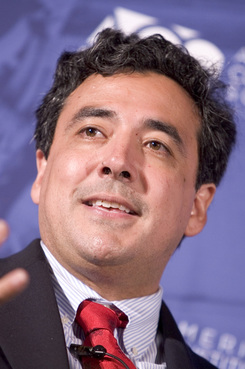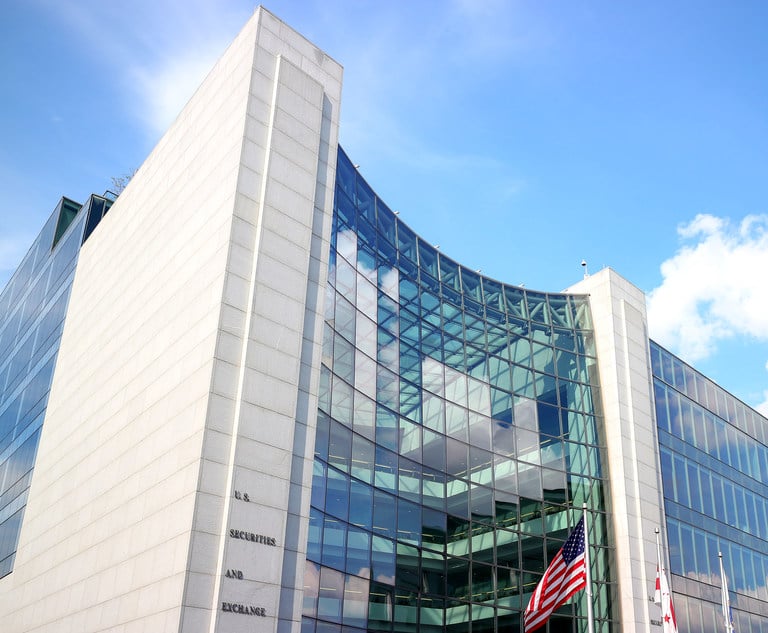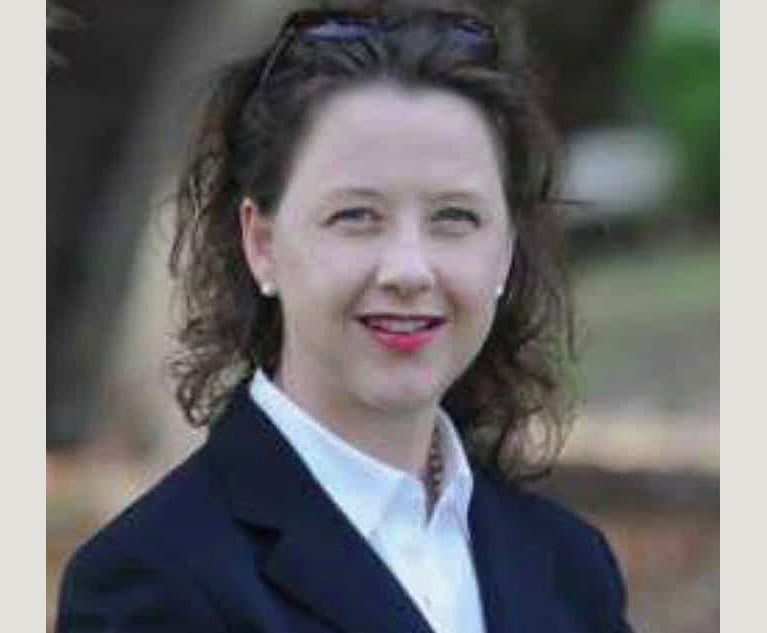Relisted Once, Twice, Three Times and Beyond. Is This Abortion Case Vexing the Justices?
U.S. Solicitor General Noel Francisco's petition in "Azar v. Garza" is not the “relist king” from recent high court terms, but it is inching toward second place. The justices have scheduled the dispute 14 times for conference. Thursday's conference marks the 15th at which the justices were set to consider the dispute.
May 17, 2018 at 11:40 AM
6 minute read
 Office of the Solicitor General at the U.S. Department of Justice in Washington, D.C. Credit: Mike Scarcella/ NLJ
Office of the Solicitor General at the U.S. Department of Justice in Washington, D.C. Credit: Mike Scarcella/ NLJ U.S. Solicitor General Noel Francisco's petition accusing American Civil Liberties Union lawyers of misleading the government in a case involving a pregnant immigrant teen's abortion has joined those disputes in the U.S. Supreme Court that for months exist in limbo.
The justices have “relisted” the abortion case more than a dozen times since it was first filed in November. A “relist” occurs when the justices consider a petition at their private conference, take no action on it and redistribute it for the next meeting.
“In the recent past, that many relists has indicated that somebody is writing an opinion either respecting or dissenting from the denial of certiorari,” Mayer Brown partner Michael Kimberly said. Kimberly and Vinson & Elkins partner John Elwood have studied the high court's relists for insights into the practice.
Francisco's petition in the case—Azar v. Garza—is not the “relist king” from recent high court terms, but it is inching toward second place. The justices have scheduled the dispute 14 times for conference. Thursday's conference will mark the 15th at which the justices were set to consider the matter.
Two cases are currently tied for second place among relisted petitions: Masterpiece Cakeshop v. Colorado Civil Rights Commission and Sykes v. United States. Both cases went before the justices 19 times.
The Masterpiece Cakeshop case, in which a Colorado baker refused to make a wedding cake for a same-sex couple, lingered on the docket for nearly a year before the justices granted review and heard arguments in December. The long delay in acting on the petition was widely attributed to the Antonin Scalia vacancy. Justice Neil Gorsuch took the Scalia seat in April 2017 and the court granted review two months later.
The Sykes petition, filed in June 2017, focused on whether Missouri's second-degree burglary statute could be divided into two offenses with separate elements. Last month, the justices sent the case back to the lower court for reconsideration in light of their decision in United States v. Naylor.
Which case is the “relist king”? That designation goes to the 2013 case Ryan v. Hurles, which the justices visited 23 times, every conference of the term, only to dismiss it at the state's request in June 2014. The issue was whether a convicted murderer was entitled to a federal court hearing on whether his trial judge was biased.
The fact a case is relisted many times does not necessarily mean the kiss of death for a petition, although the uncertainty can frustrate lawyers and clients.
Last fall, Kimberly, Elwood and Vinson & Elkins associate Ralph Mayrell analyzed relists from the October 2016 term and found that they are still “an effective prerequisite” for grants in cases to be briefed and argued, and “an excellent predictor of eventual grants.” Kimberly, Elwood and Mayrell have posted a wealth of information about relist outcome odds on SCOTUSblog.
 Solicitor General Noel Francisco. Credit: Diego M. Radzinschi/The National Law Journal
Solicitor General Noel Francisco. Credit: Diego M. Radzinschi/The National Law JournalAll of which brings us back to the petition by Francisco in the Garza case, with its controversial elements of abortion, immigration and allegations of unethical conduct by lawyers for the teenage girl.
The government lost in the trial and appellate courts, clearing the way for the immigrant teenager, who was being held in U.S. custody in Texas, to get an abortion.
“What is forcing [Jane Doe] to carry on this pregnancy is not J.D.'s choice,” wrote Judge Patricia Millett of the U.S. Court of Appeals for the D.C. Circuit. “It is not Texas law. It is the federal government's refusal to allow an abortion to go forward.”
Francisco's office contends the teen's lawyers at the ACLU misled the government about the timing of her abortion, depriving the government of an opportunity to seek review in the Supreme Court. The Justice Department's petition asks the justices to vacate the D.C. Circuit's ruling, to bar any future effect of that decision and to consider sanctions against the teen's lawyers.
The ACLU hired Sidley Austin partner and veteran Supreme Court advocate Carter Phillips to oppose the government's high court petition. Phillips, in his brief, called the government's claims against the ACLU lawyers “extraordinary and baseless.”
The reach of the D.C. Circuit's decision could soon be tested in a class action against the Trump administration on behalf of all pregnant unaccompanied, undocumented minors.
The lawsuit, filed by the ACLU, claims the administration has violated the minors' constitutional rights by preventing them from terminating their pregnancies or otherwise accessing legally available reproductive health care services while in federal custody. The administration is appealing the class certification and a preliminary injunction.
The justices have six more scheduled conferences in which they can act on the petition before the term ends. What might they do? As Kimberly said, “Who knows what's really going on in the black box?”
Read more:
ACLU Spurns U.S. Solicitor's Call for Attorney Sanctions in Abortion Case
Justice Department Faces Questions for Supreme Court Attack on ACLU Ethics
DOJ Asks SCOTUS to Discipline ACLU Attorneys in Immigrant Abortion Case
DC Circuit's Millett, Who Backed Teen's Abortion Right, Finds Role Model in RBG
Trump Lawyer Jay Sekulow Loses SCOTUS Petition in Abortion Videos Case
This content has been archived. It is available through our partners, LexisNexis® and Bloomberg Law.
To view this content, please continue to their sites.
Not a Lexis Subscriber?
Subscribe Now
Not a Bloomberg Law Subscriber?
Subscribe Now
NOT FOR REPRINT
© 2025 ALM Global, LLC, All Rights Reserved. Request academic re-use from www.copyright.com. All other uses, submit a request to [email protected]. For more information visit Asset & Logo Licensing.
You Might Like
View All
Hogan Lovells, Jenner & Block Challenge Trump EOs Impacting Gender-Affirming Care
3 minute read
GOP-Led SEC Tightens Control Over Enforcement Investigations, Lawyers Say

SEC Sued for Failing to Reveal Records Involving Simpson Thacher Attorney
4 minute read
Ex-Prosecutor’s Trial Ends as Judge Throws Out Her Felony Indictment in Ahmaud Arbery Death Case
Trending Stories
Who Got The Work
J. Brugh Lower of Gibbons has entered an appearance for industrial equipment supplier Devco Corporation in a pending trademark infringement lawsuit. The suit, accusing the defendant of selling knock-off Graco products, was filed Dec. 18 in New Jersey District Court by Rivkin Radler on behalf of Graco Inc. and Graco Minnesota. The case, assigned to U.S. District Judge Zahid N. Quraishi, is 3:24-cv-11294, Graco Inc. et al v. Devco Corporation.
Who Got The Work
Rebecca Maller-Stein and Kent A. Yalowitz of Arnold & Porter Kaye Scholer have entered their appearances for Hanaco Venture Capital and its executives, Lior Prosor and David Frankel, in a pending securities lawsuit. The action, filed on Dec. 24 in New York Southern District Court by Zell, Aron & Co. on behalf of Goldeneye Advisors, accuses the defendants of negligently and fraudulently managing the plaintiff's $1 million investment. The case, assigned to U.S. District Judge Vernon S. Broderick, is 1:24-cv-09918, Goldeneye Advisors, LLC v. Hanaco Venture Capital, Ltd. et al.
Who Got The Work
Attorneys from A&O Shearman has stepped in as defense counsel for Toronto-Dominion Bank and other defendants in a pending securities class action. The suit, filed Dec. 11 in New York Southern District Court by Bleichmar Fonti & Auld, accuses the defendants of concealing the bank's 'pervasive' deficiencies in regards to its compliance with the Bank Secrecy Act and the quality of its anti-money laundering controls. The case, assigned to U.S. District Judge Arun Subramanian, is 1:24-cv-09445, Gonzalez v. The Toronto-Dominion Bank et al.
Who Got The Work
Crown Castle International, a Pennsylvania company providing shared communications infrastructure, has turned to Luke D. Wolf of Gordon Rees Scully Mansukhani to fend off a pending breach-of-contract lawsuit. The court action, filed Nov. 25 in Michigan Eastern District Court by Hooper Hathaway PC on behalf of The Town Residences LLC, accuses Crown Castle of failing to transfer approximately $30,000 in utility payments from T-Mobile in breach of a roof-top lease and assignment agreement. The case, assigned to U.S. District Judge Susan K. Declercq, is 2:24-cv-13131, The Town Residences LLC v. T-Mobile US, Inc. et al.
Who Got The Work
Wilfred P. Coronato and Daniel M. Schwartz of McCarter & English have stepped in as defense counsel to Electrolux Home Products Inc. in a pending product liability lawsuit. The court action, filed Nov. 26 in New York Eastern District Court by Poulos Lopiccolo PC and Nagel Rice LLP on behalf of David Stern, alleges that the defendant's refrigerators’ drawers and shelving repeatedly break and fall apart within months after purchase. The case, assigned to U.S. District Judge Joan M. Azrack, is 2:24-cv-08204, Stern v. Electrolux Home Products, Inc.
Featured Firms
Law Offices of Gary Martin Hays & Associates, P.C.
(470) 294-1674
Law Offices of Mark E. Salomone
(857) 444-6468
Smith & Hassler
(713) 739-1250








